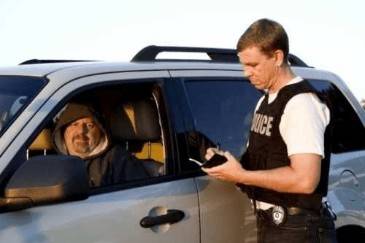Seeing those red-and-blue lights in your rearview mirror is more than enough to make anyone nervous. However, while it may seem as though the police have the right to walk all over you, you should keep in mind that you have rights, too. Knowing these rights may help you from incriminating yourself during a pullover in Colorado.
Asking Questions and Giving Answers
 After you’ve pulled over to the side of the road, the officer is likely to begin asking you questions. Pullovers happen because an officer believes that a law has been broken in some capacity. That could mean speeding, having a taillight out, or even drunk driving. Whatever the officer’s reasons, you will be asked some questions. However, under the Fifth Amendment, you do not have to answer any questions that may be incriminating to yourself.
After you’ve pulled over to the side of the road, the officer is likely to begin asking you questions. Pullovers happen because an officer believes that a law has been broken in some capacity. That could mean speeding, having a taillight out, or even drunk driving. Whatever the officer’s reasons, you will be asked some questions. However, under the Fifth Amendment, you do not have to answer any questions that may be incriminating to yourself.
That being said, you will be required to give your name, and hand over your license, car registration, and proof of insurance, so do not refuse to give any of those. While you may assume that cooperating with the police is the best course of action, anything you say can and will be used against you in the court of law. Even answering a simple “yes or no?” question could come back to bite you later.
Passengers in the car are not required to give the officer anything. As in, passengers are free to remain completely silent during the pullover, and do not have to say anything on their own behalf, or on behalf of anyone else in the car.
Sobriety Tests
If the officer suspects that you are driving under the influence of alcohol or drugs, then he or she will likely ask that you perform a field sobriety test. There are a few common tests that you may be asked to take. You may be asked to walk in a straight line and then turn around, to stand on one leg for a period of time, or to follow the officer’s finger with your eyes. In any case, with these particular tests, you are not legally required to comply. You can refuse a field test.
However, the officer may then demand that you take a chemical test. Chemical tests are done on your blood, hair, urine, or breath, in order to determine your blood alcohol content. You are not allowed to refuse a chemical test. Colorado operates under express consent laws, meaning that by holding a CO driver’s license, you have already given your consent for any chemical tests you may be asked to perform in the future. Refusing a test could result in harsh penalties, and even a license revocation.
Searching Your Car
The officer may demand to search your car after pulling you over. In the movies and TV, this is shown to be a legal right that officers have. If they want to search your car, you have to let them. However, under the Fourth Amendment, all American citizens are protected from unlawful searches by the police. That means that you do have the right to refuse if the officer asks to check your car.
However, there are certain scenarios where the officer has the right to search your vehicle even if you refuse. Those include:
- If there are illegal materials (alcohol/drugs) in plain view
- If there is reasonable suspicion that a crime has been committed
- If there is probable cause to arrest you/the driver
- If the officer believes that evidence of a crime is going to be destroyed
Those are pretty wide margins for a legal search. Oftentimes, even if an officer does not legally have the right to search your car, he or she will try to find a reason that fits within the four exceptions laid out above. For example, the officer may claim that you were driving dangerously, even if you were not, and that you are likely drunk. This would mean that there is reasonable suspicion that a crime was taking place, and the officer has the legal right to search your car.
What to Do When You Are Pulled Over
You need to know what you are required to do, and what you are not required to do.
- Do NOT answer incriminating questions. Remain silent when possible.
- Do NOT agree to a search. While the officer may find a reason to search your car anyway, it is still possible your refusal will be respected, and your car unsearched.
- DO perform chemical tests when requested. Remember, a refusal will result in penalties, even if you were not committing driving under the influence.
- DO remain polite with the officer. Refusals don’t have to be aggressive or rude. The court will not look kindly on someone who was rude to a police officer.
The next step is to call your lawyer. A defense lawyer can help you navigate the complex waters of an stop, and make sure your rights are respected. If you are later charged with a crime, your attorney can step in and defend you at trial. However, a favorable outcome will hinge on your attorney’s experience. That is why you should contact The Bussey Law Firm, P.C. As skilled criminal defense attorneys with years of experience in Colorado Springs, we can fight for you. Call us at (719) 475-2555 today.
